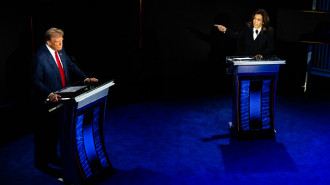Trump to Sisi: See you soon in Cairo
US President Donald Trump has said he wants to visit Egypt as soon as possible, days before he makes his first overseas tour since assuming office.
Trump told Egyptian President Abdel Fattah al-Sisi during a phone call on Monday that he plans on visiting Cairo soon to meet with the Egyptian leader, Sisi's spokesman said in a statement.
"Trump confirmed his intention to visit Cairo at the earliest chance, pointing out the importance of continued coordination between the two countries on issues of common interest," the statement read.
Trump also said he looked forward to meeting Sisi at a summit involving Arab and Islamic leaders set to be held Sunday in Riyadh.
The summit will be one of three forums held during a visit by Trump, who is making Saudi Arabia his first overseas stop since assuming office in January.
Sisi and Trump have enjoyed cordial relations since Trump took office in the White House following his shock election victory over Democrat candidate Hillary Clinton.
Last month, Trump set aside Sisi's poor human rights record to welcome him to the White House, showering the Egyptian strongman with praise.
The meeting symbolised Sisi coming in from the cold, after years of being kept at arm's length by Washington.
Trump later bragged that it "took him only ten minutes" to secure the release of Egyptian-US aid worker Aya Hijazi and her co-defendants.
Saudi King Salman on Monday expressed hope the "historic" summit between Arab and Muslim nations and Trump will enhance ties and promote tolerance, according to Saudi state media.
Trump has frequently been accused of fuelling Islamophobia but aides described his decision to visit Saudi Arabia as an effort to reset relations with the Muslim world.
Along with the six-nation Gulf Cooperation Council (GCC), at least 18 other Muslim nations have been invited to the summit, including Turkey, Azerbaijan, Niger and Indonesia, which has the world's largest Muslim population.
Saudi Arabia's regional rival Iran is not invited.
Trump plans to visit Israel after Riyadh, however, a diplomatic spat has erupted between the US and Israel after a Trump administration official said the Western Wall "was not part of Israeli territory".

![Palestinians mourned the victims of an Israeli strike on Deir al-Balah [Getty]](/sites/default/files/styles/image_684x385/public/2024-11/GettyImages-2182362043.jpg?h=199d8c1f&itok=xSHZFbmc)


![The law could be enforced against teachers without prior notice [Getty]](/sites/default/files/styles/image_684x385/public/2178740715.jpeg?h=a5f2f23a&itok=hnqrCS4x)
 Follow the Middle East's top stories in English at The New Arab on Google News
Follow the Middle East's top stories in English at The New Arab on Google News

![Voters in Michigan [Getty]](/sites/default/files/styles/image_330x185/public/2182490468.jpeg?h=a5f2f23a&itok=XMi_sWGX)
